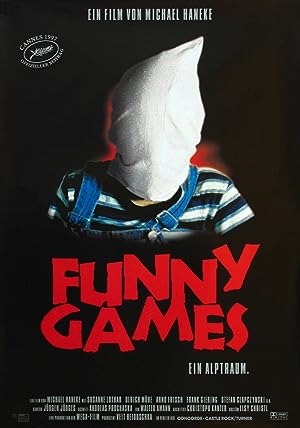Even though I have been deeply immersed in the cinematic world from all countries and eras since the mid nineties, I’ve lived a largely Michael Haneke free life. I heard his name mentioned frequently, usually in connection with the Oscars and Amour, and definitely read his New Yorker profile, but didn’t feel compelled to check out his films until a friend encouraged me to look at his cat friendly twitter feed, which I was told was the exact opposite of his films. What is the exact opposite of his twitter feed?
I’m not sure why I chose to start my Michael Haneke journey with Funny Games. Maybe it made a top 100 list along some thematic lines. Perhaps I found the plot appealing in a vaguely Desperate Hours/Dead Calm sort of way. More likely it is the only Michael Haneke film available instantly on Netflix so it was a commitment, but not as heavy a commitment as receiving a DVD.
Foreign films with subtitles require your complete attention. You have to keep up with the subtitles. Funny Games is a horror film of manners, a critique of violence and entertainment like Man Bites Dog and the anti-Desperate Hours. It is about a small family going to their country home and become hostages.
Even though Funny Games is quite unflinching about the randomness of violence and the severity of its consequences by keeping the camera still for a long time and showing the victims’ reactions juxtaposed with the absurdity of their surroundings, it is decorous in its depiction of it. Funny Games implies a lot of violence, but rarely shows the terminal blow. Most people find Funny Games notable for Haneke’s narrative breaking the fourth wall by having the kidnappers address the audience in the same manner that they address their victims or rewinding and undoing a scene that finally gives the audience what they want. What I found notable is the examination of which rules are upheld and which are permissibly violated within the story, but more severe. One must remain polite, generous and not respond aggressively or expect a justified violent response within the rules of the narrative and society. I vaguely remember that the New Yorker article mentioned that Haneke’s films culturally address the Nazi legacy on post WWII Germany, but I thought that this societal imprisonment of appropriate responses to violation was also applicable to American society today.
I am surprised that most people are not impressed by the amazing and desperate emotional performance of the couple after a particularly harrowing event. They are simultaneously individually gutted and collectively broken, but emotionally connect in such a way that shows an immense love and desire to not inflict further pain on the other. I have no desire to see the American remake because even though Naomi Watts and Tim Roth are good actors, I have no idea how they can NOT look like they are acting in those scenes in comparison to Ulrich Muhe and Susanne Lothar who just seemed to BE their characters.
Don’t watch Funny Games expecting Cape Fear or for it to adhere to the rules of the standard action thriller. Do expect the dog to die and your expectation of how things should go to be changed. Do feel challenged about why you enjoy consuming violence.
Stay In The Know
Join my mailing list to get updates about recent reviews, upcoming speaking engagements, and film news.





